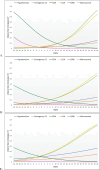Reconsideration of lowering gestational weight gain guidelines in pregnant women diagnosed with gestational diabetes: evidence from a Belgian study
- PMID: 40102908
- PMCID: PMC11921705
- DOI: 10.1186/s12916-025-03992-5
Reconsideration of lowering gestational weight gain guidelines in pregnant women diagnosed with gestational diabetes: evidence from a Belgian study
Abstract
Background: The suitability of the United States National Academy of Medicine guidelines for gestational weight gain in women with gestational diabetes remains uncertain, raising global concerns. This study aimed to evaluate the association of gestational weight gain with pregnancy and birth outcomes and to determine optimal ranges for gestational weight gain per pre-pregnancy body mass index category in women with gestational diabetes.
Methods: An epidemiological analysis between 2009-2018 analyzed a large Belgian cohort of singleton pregnancies with gestational diabetes and gestational age 38-40 weeks. Multivariate logistic regression assessed associations between gestational weight gain and relevant pregnancy and birth outcomes, with and without adjustment for confounding variables, including maternal age, origin, education, mode of conception, parity, gestational age at delivery, social deprivation, and year of delivery. Potential optimal weight gain ranges were calculated by minimizing the combined risk of small- and large-for-gestational-age infants (SGA, LGA).
Results: A total of 13,060 women with gestational diabetes were included. Compared to recommended weight gain, gestational weight gain above guidelines occurred in 26.9% and was associated with an increased risk of gestational hypertension (aOR 1.41, 95% CI 1.20-1.66, p < 0.001), emergency caesarean section (aOR 1.45, 95% CI 1.25-1.69, p < 0.001), LGA infants (aOR 1.84, 95% CI 1.63-2.08, p < 0.001), and macrosomia (aOR 1.78, 95% CI 1.55-2.04, p < 0.001). Weight gain less than recommended (40.2%) was associated with a decreased risk of gestational hypertension (aOR 0.81, 95% CI 0.69-0.96, p = 0.015), LGA infants (aOR 0.58, 95% CI 0.50-0.66, p < 0.001), and macrosomia (aOR 0.57, 95% CI 0.49-0.65, p < 0.001), but at the expense of an increased risk of SGA infants (aOR 1.68, 95% CI 1.45-1.96, p < 0.001) and low birth weight (aOR 2.28, 95% CI 1.57-3.32, p < 0.001). Based on current analysis, the optimal ranges for gestational weight gain would be 9 to 14 kg for women with a normal weight, 1 to 9 kg for women with overweight, and -7 to 1 kg for women with obesity.
Conclusions: This Belgian study suggests that optimal gestational weight gain for singleton at-term pregnancies complicated by gestational diabetes should be lower than current recommendations, highlighting the need to reevaluate gestational weight gain guidelines in this context.
Keywords: Gestational diabetes mellitus; Gestational weight gain; National Academy of Medicine guidelines; Pregnancy; Recommendations.
© 2025. The Author(s).
Conflict of interest statement
Declarations. Ethics approval and consent to participate: As this study was based on database research of data collected as part of routine care for quality control, no ethics approval was needed. Consent for publication: Not applicable. Competing interests: KB reports research funding and receipt of study devices from Medtronic for the investigator-initiated CRISTAL study, receipt of study devices from Dexcom, received study medication of Novo Nordisk for the investigator-initiated SERENA study, received consulting fees from Astrazeneca and Lilly, and served on the speaker bureau for Novo Nordisk, AstraZeneca and Mundipharma. RD reports receiving consulting fees from Metagenics, Procter & Gamble Company and Janssen Pharmaceutics and served on the speaker bureau for Metagenics, Procter & Gamble Company and Janssen Pharmaceutics. AB reports research support for analyzing epidemiological data (2023-2024) from Novo Nordisk. CM2 serves or has served on the advisory panel for Novo Nordisk, Sanofi, Eli Lilly and Company, Novartis, Boehringer Ingelheim, Roche, Medtronic, Imcyse, Insulet, Biomea Fusion and Vertex. Financial compensation for these activities has been received by KU Leuven; KU Leuven has received research support for CM2 from Medtronic, Imcyse, Novo Nordisk, Sanofi and ActoBio Therapeutics; CM2 serves or has served on the speakers bureau for Novo Nordisk, Sanofi, Eli Lilly and Company, Medtronic and Boehringer Ingelheim. Financial compensation for these activities has been received by KU Leuven. CM2 is president of EASD. All external support of EASD is to be found on www.easd.org. All disclosures are unrelated to the present work.
Figures

Similar articles
-
Association between Body Mass Index and Gestational Weight Gain with Obstetric and Neonatal Complications in Pregnant Women with Gestational Diabetes.Acta Med Port. 2022 Oct 3;35(10):718-728. doi: 10.20344/amp.15896. Epub 2022 Oct 3. Acta Med Port. 2022. PMID: 35471140
-
Association between gestational weight gain and perinatal outcomes among women with gestational diabetes mellitus.Front Endocrinol (Lausanne). 2025 Mar 28;16:1531814. doi: 10.3389/fendo.2025.1531814. eCollection 2025. Front Endocrinol (Lausanne). 2025. PMID: 40225328 Free PMC article.
-
Inappropriate gestational weight gain impact on maternofetal outcomes in gestational diabetes.Ann Med. 2023 Dec;55(1):207-214. doi: 10.1080/07853890.2022.2159063. Ann Med. 2023. PMID: 36538030 Free PMC article.
-
Interpregnancy weight change and adverse pregnancy outcomes: a systematic review and meta-analysis.BMJ Open. 2018 Jun 4;8(6):e018778. doi: 10.1136/bmjopen-2017-018778. BMJ Open. 2018. PMID: 29866719 Free PMC article.
-
Association between prepregnancy body mass index or gestational weight gain and adverse pregnancy outcomes among Chinese women with gestational diabetes mellitus: a systematic review and meta-analysis.BMJ Open. 2024 Feb 17;14(2):e075226. doi: 10.1136/bmjopen-2023-075226. BMJ Open. 2024. PMID: 38367974 Free PMC article.
Cited by
-
Impact of Maternal Overweight and Obesity on Pregnancy Outcomes Following Cesarean Delivery: A Retrospective Cohort Study.Healthcare (Basel). 2025 Aug 2;13(15):1893. doi: 10.3390/healthcare13151893. Healthcare (Basel). 2025. PMID: 40805926 Free PMC article.
References
-
- IOM. (Institute of Medicine) and NRC (National Research Council). Weight gain during pregnancy: reexamining the guidelines. 2009.
MeSH terms
LinkOut - more resources
Full Text Sources

